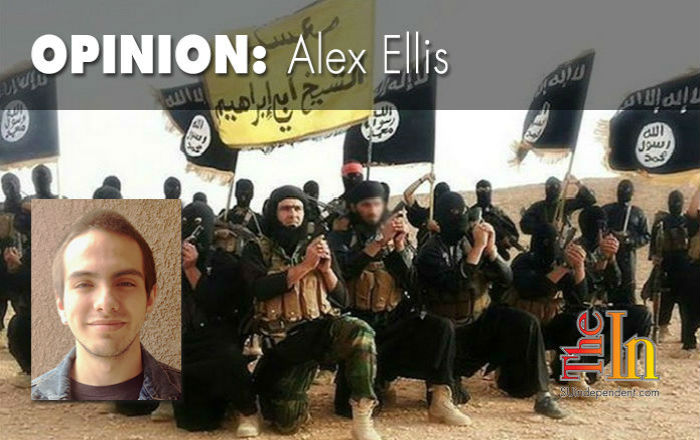 On Jan. 7, the western world was shook as radical Islamic militants attacked the satirical French magazine Charlie Hebdo. The terrorists, armed with weapons illegal in France, forced their way into the magazine’s offices while shouting “Allahu Akbar!”, and left 12 dead. Two days later another Islamic terrorist, Amedy Coulibaly, went on a two day spree that left five dead and eleven others wounded. In the end three terrorists were killed, while the fourth voluntarily turned himself in to French authorities. With 17 innocents and two suspects dead, the incident was the worst terrorist attack in Europe since 1995. It should be noted that the attack in 1995, which left eight dead and over 100 wounded, was also carried out by Islamic militants.
On Jan. 7, the western world was shook as radical Islamic militants attacked the satirical French magazine Charlie Hebdo. The terrorists, armed with weapons illegal in France, forced their way into the magazine’s offices while shouting “Allahu Akbar!”, and left 12 dead. Two days later another Islamic terrorist, Amedy Coulibaly, went on a two day spree that left five dead and eleven others wounded. In the end three terrorists were killed, while the fourth voluntarily turned himself in to French authorities. With 17 innocents and two suspects dead, the incident was the worst terrorist attack in Europe since 1995. It should be noted that the attack in 1995, which left eight dead and over 100 wounded, was also carried out by Islamic militants.
The attack has caused controversy around the world and once again sparked up debate about Islam and terrorism. The dialogue, although expected, is equally disgusting from both sides. On one side we have the ultra-politically-correct, who in their holier-than-thou quest to be the most tolerant and least racist people they can, all but excuse the terrorists for the attack, and even blame the employees at Charlie Hebdo for causing it. As most of these people are from the left and probably feminists, I would point out the irony of them blaming the victim here, but that is a discussion best left for later.
On the other side of the debate are the actual bigots and racists who attempt to hide their hatred behind halfhearted arguments in support of free speech. One of the loudest voices in this crowd is Faux News’ Judge Jeanine Pirro, who, in reference to Muslims after the Charlie Hebdo attack, got on the air and said, “We need to kill them!” She then went on to say that we should arm the more moderate Muslims and simply, “Look the other way.” Someone should tell Pirro that the United States has already tried this before – with Al-Qaeda, with the Mujahedeen, with the Syrian rebels – and I don’t need to tell you what happened with each of those groups.
While a rational person should instantly be able to recognize flaws in the arguments of each of these groups, let”s address them directly here.
First, let us dispel the myth that “Islam is a religion of peace,” or that “Islam has nothing to do with the violence committed in its name.” According to the global terrorism index, religious extremism has been the main cause of terrorism since 9/11. Of all the deaths caused by terrorism, two thirds of them were caused by just four groups: ISIS, Boko Haram, Al-Qaeda, and the Taliban. One glance at the United States’ list of terrorist organizations quickly shows who is responsible for the remaining third: Hamas, Hezbollah, Palestinian Islamic Jihad, Al-Shabaab, Libyan Islamic Fighting Group, Army of Muhammad, etc. While there are many groups on this list, there is one thing nearly all of them have in common: they all claim to represent and fight for Islam.
While many apologists continuously claim that only a small minority of the Islamic world engages in or supports these terrorist acts, they ignore basic math and statistics gathering. With a base following of about 1.7 billion, a “small minority” of one percent would still yield around 17 million Jihadis and supporters. However, research shows that 1 percent is not a realistic estimate for the size of this group.
According to studies conducted by World Public Opinion and Pew Research Center, 65 percent of Egyptians said they wanted strict Sharia law in every Islamic country. In Jordan, Hezbollah and Hamas had approval ratings of 55 and 60 percent respectively. 78 percent of Palestinians had either positive or mixed feelings about Osama-Bin-Laden, while 44 percent of Pakistanis viewed him as a martyr. In short, the percentage of Muslims who support violence and terrorism in the name of Islam is not a “tiny minority” as the ultra politically-correct love to claim.
However, this is no justification to “kill them” all, as judge Pirro suggests we do. Those who know history know that Christianity was once as violent and bloodthirsty as modern Islam. Most European countries ruled under a Christian doctrine, and protestant and Catholic groups had constant war and tension with each other. Despite this, Christianity was able to reform, secularize, and end its violent ways. Just as the support for such reforms grew to a breaking point then, so today is the support growing for reformations within Islam.
So what can we outsiders to Islam do? Directly, besides continuing to resist violent attacks, not much. However, there is a middle ground we can take between wishing death on all Muslims and being an apologist for terrorist attacks. This would begin with shifting our focus away from radicals of ISIS and Al-Qaeda, and start paying more attention to the many Muslims who wish to bring the Western ideas of liberty, equality, and free speech to the Muslim world. Who are these people? They are the millions of Muslims around the world outraged by the attacks on Charlie Hebdo. They are the members of the Kurdish Worker’s Party, who fight to protect their families and their communities from ISIS brutality. They are Muslim leaders such as Tareq Yousef Al-Masri, who called radical Islam “a cancer” and encouraged Muslims to throw the radicals out.
Until we are able to stand in support and solidarity with these people, the struggle against radical Islam will never cease. For the war against a toxic ideology can never be won with bombs or violence, but with the hearts and minds of a people seeking to create a better world for us all.



